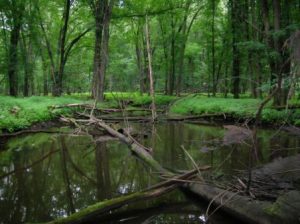Update, 12/31/18: Governor Rick Snyder has signed a limited version of this bill into law. The implications remain unclear, but experts suggest that the passed version will have far less negative impact on wetlands and that public opposition to the bill helped encourage late changes.
Update, 12/3, 5:15 pm: The bill could be voted on tomorrow, 12/4/18, as early as 8:30 am. Call your state senator, provide written comments to the committee clerk (phone 517-373-5312), and call Governor Snyder’s office (phone 517-373-3400). Tell them to reject Bill SB1211 because it will harm Michigan’s remaining pristine natural resources.
A bill being rushed through the Michigan Senate Natural Resources Committee during the lame duck session would severely cripple protections for Michigan’s wetlands including many in the Huron River watershed. The bill is being discussed tomorrow, 11/28/18, at 12:30 pm. It would have the following effects.

- It would increase the minimum size of protected wetlands, leaving wetlands under 10 acres unprotected. Half of Michigan’s currently protected wetland areas would suddenly be vulnerable. The implication is particularly bad for the Huron River watershed since many wetlands are small and tucked between developed areas where they are critical buffers for preserving water quality.
- It would change the definition of regulated streams and lakes that would make it easier to pollute and abuse Michigan’s waterways.
- It would make the permitting process for new developments that affect wetlands more complicated. It would require developers to apply for state and federal permits separately instead of applying for them at the same time as they do in the current process.
- It would disrupt the current wetland banking system. In the current system, developers building on or near wetlands may be required to replace wetlands. Alternatively, the developer can purchase credits from other companies that have already built other wetlands and set them aside. The new bill could upset that system by devaluing the ecological wetlands that have already been set aside as investments.
Marshlands are already valuable to wildlife and people. They filter water as remove polluted runoff. They reduce flood risk in our neighborhoods. They provide habitat for the plant, animal, and fish species that keep the ecosystems we rely on strong.
Midwestern wetlands are also particularly important for fighting climate change. Because they include peat and so much organic material, wetlands store a disproportionate amount of carbon. When they flood, they also trap sediment and decomposing material, burying away the carbon that it contains before it can make it into the atmosphere. Compared to, say, agricultural soil, wetlands store 40 times or more carbon per acre.
Recent international and national reports have highlighted the urgent need to protect vital landscapes to fight climate change. The Upper Midwest has already lost about 50% of the region’s wetlands to development. Wetlands in some areas have been erased from the landscape altogether. The need to protect these ecosystems is greater than ever.
What you can do:
Call your state senator, provide written comments to the committee clerk (phone 517-373-5312), and call Governor Snyder’s office (phone 517-373-3400). Tell them to reject Bill SB1211 because it could harm Michigan’s remaining pristine natural resources.



